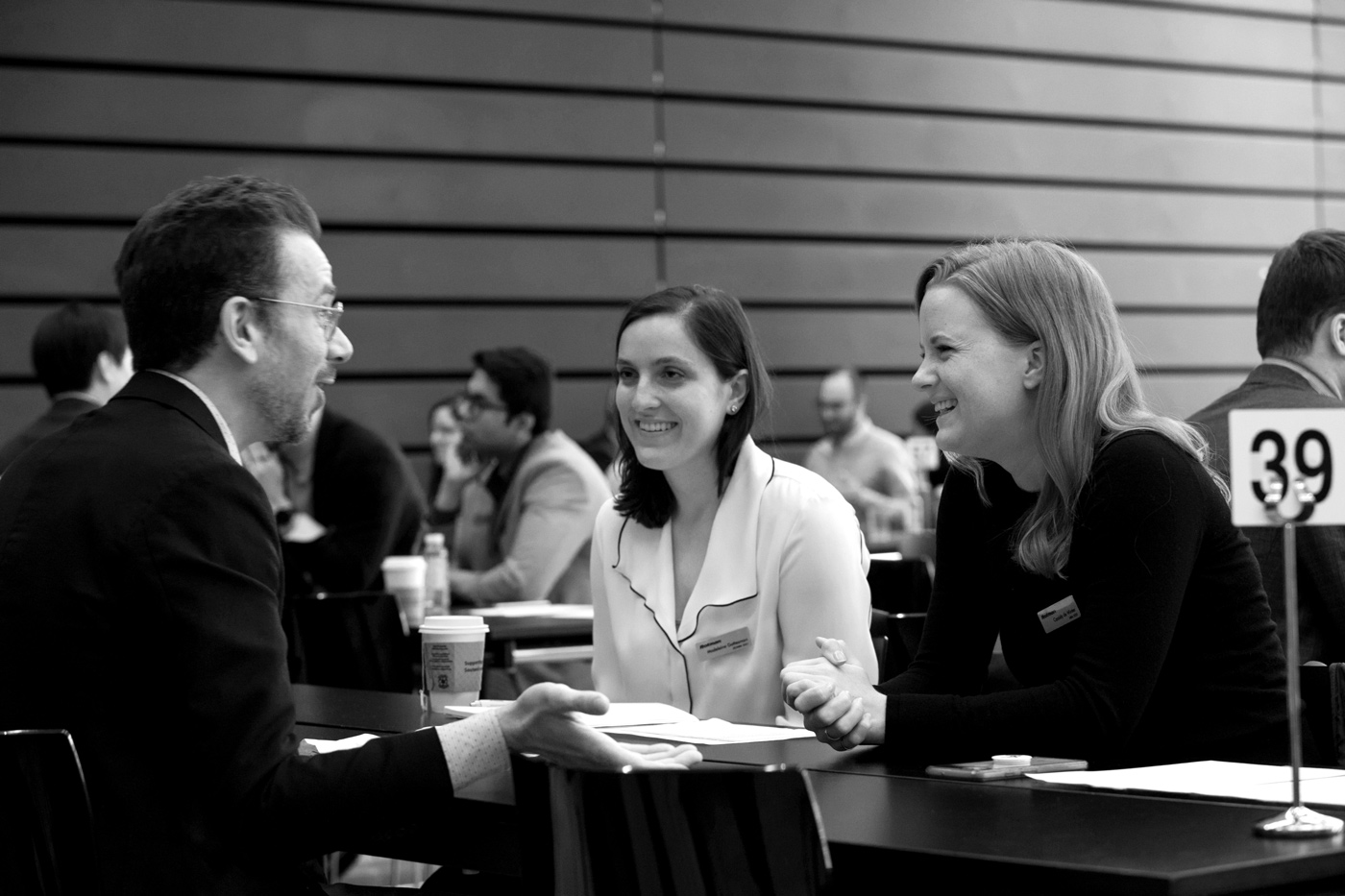Pedagogy
The CDL Course is designed to teach students about the formation, financing, and management of massively scalable ventures through a series of close interactions with early-stage science and technology ventures and their mentors
Through a nine-month CDL Course offered at each CDL location, students have four core learning experiences:
- Evaluation of early-stage science and technology-based ventures.
- Exposure to CDL venture and mentor engagement and the investment process.
- Strategy instruction tailored to early-stage science and technology-based ventures.
- Business development and/or internal consulting experience with a CDL venture.
CDL courses are targeted at business students who are interested in careers in strategy, entrepreneurship, entrepreneurial finance, new product development, and economic development policy.
Complementary learning opportunities in CDL pedagogy may be offered at selected CDL locations:
- Entrepreneurial Finance: Provide the tools needed to support and assist their ventures through a fundraising event.
- Technology Commercialization: Explain the process by which technical innovation transitions from a research lab (or similar) into proprietary corporate intellectual property
- Professional Development: Training around research methods, project management, modelling & projection, and organizational behavior
- Technical Literacy: Empower students to learn and increase their technical literacy around technologies represented at their CDL site
- Guest Speakers: Exposes students to a broader scope of ideas, tips, and information to promote pragmatic real world learning
- Staff Mentoring: Connect members of the CDL operating team to students to facilitate relationship building and observational learning
- Fellowship Awards: University-funded awards for participating in the CDL program and/or direct acceptance to the program
Power and Prediction: The Disruptive Economics of Artificial Intelligence
In the fall of 2021, a course designed by Professor Ajay Agrawal, Avi Goldfarb and Joshua Gans and, presented by CDL was offered to Rotman alumni and their guests at no charge. Over 300 Rotman alumni and guests participated in the course. It was delivered online via Zoom. Participants were also invited to join a Slack channel for peer discussions and information sharing. CDL collaborated with the Rotman Alumni Office for the distribution of invitations and session execution support.
Course Description
We make thousands of decisions every day. We have agency over our personal decisions. At the same time, companies, governments, and not-for-profits are defined by their authority and influence over other decisions.
The two key ingredients to decision-making are prediction and judgment. We perform both together in our minds, often without realizing it, every time we make a decision. The rise of AI is shifting one of those ingredients – prediction – from humans to machines.
Relieving humans from the cognitive load of prediction – while increasing the speed and accuracy of this function – is setting the stage for a flourishing of new decisions. Many of these decisions are new because we previously hid them via rules, insurance, and over-engineering. We did such a good job hiding them that we’ve long since forgotten they were ever there. AI is increasing the returns to unearthing these long-hidden decisions. Today, we stand on the precipice of a renaissance in decision-making.
This has profound implications for business and society. Decision-making confers power. Thus, changes in decision-making can lead to changes in power. Centralizing or decentralizing decision-making will consolidate or distribute power. Shifting who makes decisions will shift who wields power. In industry, power confers profits. In society, power confers control.
At a Glance
Our impact
in numbers

500+
students participating in CDL courses
13
courses offered across 10 CDL locations
At a Glance
Our impact
in numbers
12
university faculty teach the CDL course
500+
students participating in CDL courses
13
courses offered across 10 CDL locations
12
university faculty teach the CDL course
Lily Elsner
Lily Elsner says she received this advice from older alums at Wellesley College. So when she started her MBA at the University of Oxford’s Saïd Business School, she decided to try out Creative Destruction Lab (CDL). She was intimidated by startups.
Startups seemed high stakes and risky. Elsner notes there’s also a lot of chatter in the media about how hard it can be for women-led ventures to get investment.
But she says CDL gave her “robust experience” with startups “in a very low pressure environment.”
Elsner worked with Arctoris, which was a participating venture in CDL-Oxford’s AI stream. She’s since joined the company as head of strategy.
Startups “seem like an unclimbable mountain,” she said, “but I found that CDL removed all that.”
It was helpful having professors she already knew in the room, there to mediate, engage the students and make sure concepts and jargon were explained.
“It was incredibly empowering to me to be like, ‘Actually, this is something that I absolutely could do.’”
“I was glad that I was asked to do that after I had taken some of the initial MBA classes, especially given that it was just a one-year program, because I was able to think about it in a lot of different ways, and use some of the things I’d learned in class,”

Lily Elsner Saïd Business School, University of Oxford
“It was one thing to get my experience through the MBA program to understand it all. But it was just so intriguing to me to actually be able to witness that firsthand,”
Haitham Mansour Haskayne School of Business, University of Calgary
“Seeing what it really takes and how much work and effort goes into translating something from lab to market … It’s just priceless.”
Amir Hejri Scheller College of Business, Georgia Institute of Technology
“It’s an opportunity to live the role.”
Rachel Taylor Rotman School of Management, University of Toronto
CDL Reading Group
CDL has redeployed resources by applying the CDL model and community to rapidly translate science into solutions, inspire a young generation of entrepreneurs, and partner with an organization to build an ecosystem with diverse representation and equal access to broaden investments.

The CDL Reading Group is focused on the topic “On Being Human.” It is easy to become preoccupied with the latest wave of technological triumphs and, at the same time, lose track of their implications for humanity. Like the proverbial frog-in-the-gradually-heated-to-boiling-pot, we might be distracted by the glare of progress at the very moment when clear vision is most required.
It is important to step back and reflect. That is the purpose of the CDL Reading Group.
From artificial intelligence to synthetic biology, novel technologies are emerging rapidly that promise to transform humanity at scale. The CDL Reading Group enhances thinking and facilitates dialogue on our advancements as a species.
The CDL Reading Group provides Rotman students and alumni an opportunity to engage weekly in interdisciplinary discussions alongside industry experts and business leaders. This community has the potential to enable new collaborations with experts from across a wide range of scientific and technological domains and business leaders and investors in a wide range of industries.
The Reading Group includes about 200 scientists, inventors, entrepreneurs, investors, business leaders, government officials, professors, and students. For example, members include over 40 founders/CEOs of tech companies, the former CEO of Goldman Sachs Canada, a former Commander of the International Space Station, the first woman space traveller and CEO of X-Prize, a former head of McKinsey, the former managing partner of a large law firm, several venture capitalists and angel investors, scientists from DeepMind, Palantir, and Google, and professors of law, economics, philosophy, political science, literature, medicine, and computer science.
Over the past two seasons, the CDL Reading Group has met regularly to discuss these texts:
- Neuralink and the Brain’s Magical Future, by Tim Urban (2017)
- On Intelligence, by Jeff Hawkins (2004)
- A Collection of Definitions of Intelligence, by Shane Legg and Marcus Hutter (2007); On the Measure of Intelligence, by Francois Chollet (2019); “John McCarthy’s Definition of Intelligence” by Richard Sutton in Journal of Artificial General Intelligence 11(2) 66-67, 2020
- The Perfect Match, by Ken Liu (2012)
- Machines Like Me, by Ian McEwan (2019)
- The Alignment Problem: Machine Learning and Human Values, by Brian Christian (2020)
- Nexus, by Ramez Naam (2012)
- The State Machine & Under the Gaze of Big Mother, Yudhanjaya Wijeratne (2020)
- Frankenstein, Mary Shelley (1818)
- Machinehood, S.B. Divya (2021)
- Of the Madness of Mad Scientists and Cryogenics: A Symposium, from In Other Worlds, by Margaret Atwood (2011) ; The Future of Everything, a 6min speech by Margaret Atwood (2018
- Reinforcement Learning: An Introduction, by Richard Sutton and Andrew Barto (second edition, 2020)
- Three stories from the book Falling in Love with Hominids, by Nalo Hopkinson (2015) (Message in a Bottle, Old Habits, Men Sell Not Such in Any Town)
- A Thousand Brains: A New Theory of Intelligence, by Jeff Hawkins (2021)
- The Selfish Gene by Richard Dawkins (1976)
- Out of Control by Kevin Kelly (1994)
- The New Breed: What Our History with Animals Reveals about Our Future with Robots, by Kate Darling (2021)
- The Hidden Girl and Other Stories, by Ken Liu (2020)
- Automaton Biographies, by Larissa Lai (2009)
- What Kind of Creatures are We?, by Noam Chomsky (2015)
- The Big Picture: On the Origins of Life, Meaning, and the Universe, by Sean Carroll (2017)
- Machines of Loving Grace, by John Markoff (2015)
- Turing Trap by Erik Brynjolfsson
- Cats Pictures Please, by Naomi Kritzer (2015)
- The Hidden Girl and Other Stories, by Ken Liu (2020) (The Reborn, Thoughts and Prayers Cutting)
- Goliath, by Tochi Onyebouchi (2022)
- We are Satellites, by Sarah Pinsker (2021)
- Reality+, by David Chalmers (2022)
Several authors of the texts above share their reflections on the CDL Reading Group here: Margaret Atwood, Noam Chomsky, Nola Hopkinson, Kevin Kelly, Sean Carroll, Mark Carney, Richard Dawkins, S.B. Divya, Ken Liu, Yudha Wijerante, Richard Sutton, Ramez Naam, David Guston, Brian Christian, Stuart Russell and Jeff Hawkins.
What I really like about the CDL Reading Group is that it is informed, intelligent, thoughtful, and original people but from a wide spectrum...to discuss common issues. That has been perspective-building for me and I have really enjoyed that side of it. And finding books that I might not have read otherwise.

Chris Hadfield • Fellow, CDL-Toronto Former Commander of the International Space Station
What's truly amazing is the breadth of people's knowledge and their links to places that I've never even thought about looking for new ideas. It's also great debating these questions; the debates get your blood moving and get you thinking about taking on a position that you may not normally try on. I enjoy it.

Christine Tovee • Fellow, CDL-Paris and CDL-Toronto Former Chief Technology Officer, Airbus Group